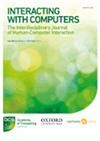Developing and Evaluating a Virtual Reality Videogame Using Biofeedback for Stress Management in Sports
IF 1.3
4区 计算机科学
Q3 COMPUTER SCIENCE, CYBERNETICS
引用次数: 2
Abstract
Stress is a reaction of the body to external challenges, whether physical or psychological. In sports, there are stress factors that affect the athlete's performance, especially in team sports that involve short, high-intensity exercise cycles followed by short recovery periods, such as American football. The lack of stress regulation mechanisms can be detrimental to the individual and collective performance of athletes. Biofeedback systems have shown promising clinical results in regulating stress for sports competitions. However, there is a lack of scientific evidence to support their efficacy, and technologies, such as virtual reality videogames, have not been extensively explored. In this article, we present the development and pilot testing of Virtual Autonomic Nervous System (VANS), a virtual reality videogame using biofeedback that supports stress management training in athletes. VANS uses an optical heart rate sensor and aims at keeping the heart rate below a given threshold to control features within the game. We evaluated the usability and user experience of VANS through a 1-week deployment study with 10 American footballers. Our results show that VANS outperformed a commercial videogame used for biofeedback training and considerably reduced stress in our participants. Therefore, VANS could provide stress management training for future matches and competitions. Finally, we reflect on aspects of our design and discuss future directions of our work.基于生物反馈的虚拟现实视频游戏的开发与评估
压力是身体对外部挑战的反应,无论是生理上的还是心理上的。在体育运动中,有一些压力因素会影响运动员的表现,尤其是在团队运动中,这种运动需要短时间的高强度运动周期,然后是短时间的恢复期,比如美式足球。缺乏压力调节机制会对运动员的个人和集体表现产生不利影响。生物反馈系统在调节体育比赛压力方面已显示出良好的临床效果。然而,缺乏科学证据来支持它们的功效,而虚拟现实视频游戏等技术也没有得到广泛的探索。在本文中,我们介绍了虚拟自主神经系统(VANS)的开发和试点测试,这是一种使用生物反馈支持运动员压力管理训练的虚拟现实视频游戏。VANS使用光学心率传感器,旨在将心率保持在给定阈值以下,以控制游戏中的功能。我们通过对10名美国足球运动员进行为期一周的部署研究,评估了VANS的可用性和用户体验。我们的研究结果表明,VANS的表现优于用于生物反馈训练的商业视频游戏,并大大减轻了参与者的压力。因此,VANS可以为未来的比赛和比赛提供压力管理训练。最后,我们反思了我们设计的各个方面,并讨论了我们未来的工作方向。
本文章由计算机程序翻译,如有差异,请以英文原文为准。
求助全文
约1分钟内获得全文
求助全文
来源期刊

Interacting with Computers
工程技术-计算机:控制论
CiteScore
2.70
自引率
0.00%
发文量
12
审稿时长
>12 weeks
期刊介绍:
Interacting with Computers: The Interdisciplinary Journal of Human-Computer Interaction, is an official publication of BCS, The Chartered Institute for IT and the Interaction Specialist Group .
Interacting with Computers (IwC) was launched in 1987 by interaction to provide access to the results of research in the field of Human-Computer Interaction (HCI) - an increasingly crucial discipline within the Computer, Information, and Design Sciences. Now one of the most highly rated journals in the field, IwC has a strong and growing Impact Factor, and a high ranking and excellent indices (h-index, SNIP, SJR).
 求助内容:
求助内容: 应助结果提醒方式:
应助结果提醒方式:


